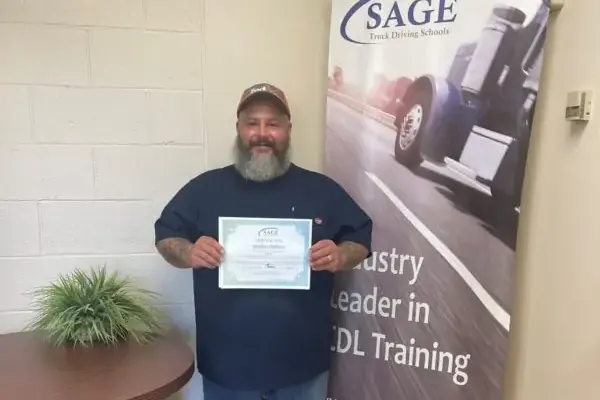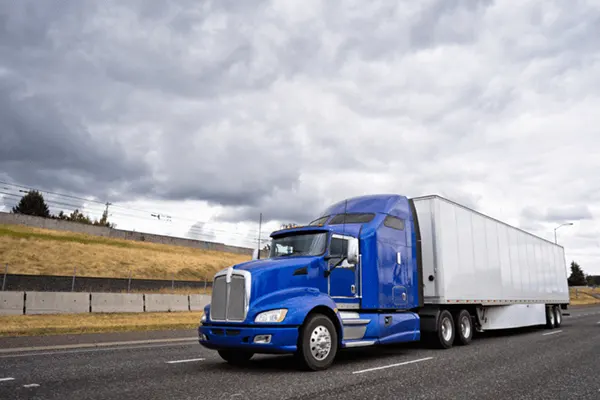
Taking Dreams on the Road: Deaf Student Completes CDL Training at Sage Truck Driving Schools
Stephen Arellano may not be able to hear, but his visual skills and attentiveness make him a perfect candidate for a career as a CDL truck driver.
“I wanted to become a truck driver because a lot of deaf people have great visual acuity and visual skills in general,” Stephen said. “We are trying to challenge the stereotypes of deaf people and having us all be seen as equals. We use our eyes more, we have a higher priority with things that are visual, and we also aren’t distracted by auditory things, so we are able to pay closer attention to things visually.”
Since 2013, people who are deaf or hard of hearing have been able to earn a commercial driver’s license (CDL), but the process is still far from easy. They must request an exemption from the Department of Transportation’s Physical Qualification Standards, which requires a lot of paperwork and patience. It is only after months of processing is complete that a potential driver can begin their training program.
Stephen completed his CDL training at Sage Truck Driving school in Grand Junction.
“Sage took the time to train me and make sure everything was good,” he said. “They were very professional in how they went about doing everything. It was a wonderful experience. They had great leadership and great teachers as well.”
“Stephen’s transformation was amazing to watch and be a part of. We absolutely want to thank the Interpreters that showed up and supported him every day. They were amazing,” said School Director Eschelle Hulse. “And most of all we want to thank Stephen Arellano for coming to our school and showing us how to adjust and accommodate people that have exceptionalities.”
While learning to control the truck, apply safety measures and understand routes all took some getting use to, Stephen said he had no trouble understanding or communicating during his training. There is an abundance of technology and resources available today to help like captioning services and video phone services.
“I don’t like labels about being disabled because all I cannot do is hear, but I can do many things and I work very hard to compensate,” Stephen said. “I ask a lot of questions and I try to build a bond with people so we can understand each other. I make sure and verify that my communication is clear, and the expectations are clear. During training I had an interpreter there to help me, vocational rehab has been supportive of me, and there are several organizations that have been an ally to help me. I feel that I have been able to learn quite a bit.”
Stephen is now in the process of applying for jobs. He is excited about the possibility of truck driving as a long-term career.
“My motivation is to find a good job that I can enjoy for many years,” he said. “I want to be with a good company that has been around for a while, and I want to show them that I am dependable, punctual and safe and I work hard to get along with people.
“I feel like Sage is the best company out there at training truck drivers. I think they are very supportive and helpful. They are invested in their student’s success. I think they have a good reputation. You can have a good future with that school. It was a very enjoyable and successful program for me, and it could be the same with you.”
How are road safety and communication issues addressed for deaf truck drivers during their training and in actual driving situations?
- Deaf truck drivers, like Stephen, leverage their visual acuity and attentiveness to compensate for the inability to hear auditory cues. During training, technology and resources such as captioning services and video phone services are utilized to aid communication. For road safety and communication in actual driving situations, deaf drivers can use visual alerts for emergency signals and rely on text-based communication devices to interact with dispatchers and others. The training programs likely include specific modules that focus on enhancing these visual skills and making use of technology to ensure safety and effective communication on the road.
What legal or regulatory challenges do deaf individuals face when applying for a CDL, beyond the initial exemption process?
- Beyond the initial exemption process from the Department of Transportation’s Physical Qualification Standards, deaf individuals might face additional challenges such as ensuring access to appropriate training resources, finding schools equipped with necessary accommodations (like interpreters), and potentially overcoming biases from employers. However, the blog post does not detail these aspects extensively. The Americans with Disabilities Act (ADA) requires reasonable accommodations for qualified individuals, which can help mitigate some challenges by ensuring access to interpreters or other necessary aids during both training and testing phases.
Are there any success stories of other deaf individuals who have pursued a career in truck driving after Stephen?
- The blog post does not mention specific success stories of other deaf individuals in truck driving careers following Stephen’s experience. However, the narrative implies a positive shift towards inclusivity and accommodation within the industry, suggesting that Stephen’s case might inspire other deaf individuals to pursue careers in truck driving. Success in this field for deaf individuals likely depends on the availability of supportive training programs, technological aids for communication, and employers willing to make necessary accommodations.
Disclaimer: The information in this article is based on the data available as of its writing and is meant to inform and guide prospective CDL trainees. For the most current information and specifics about CDL training programs, please contact SAGE Truck Driving Schools directly.
Please fill out the information below and our team will reach out to chat about your options.


